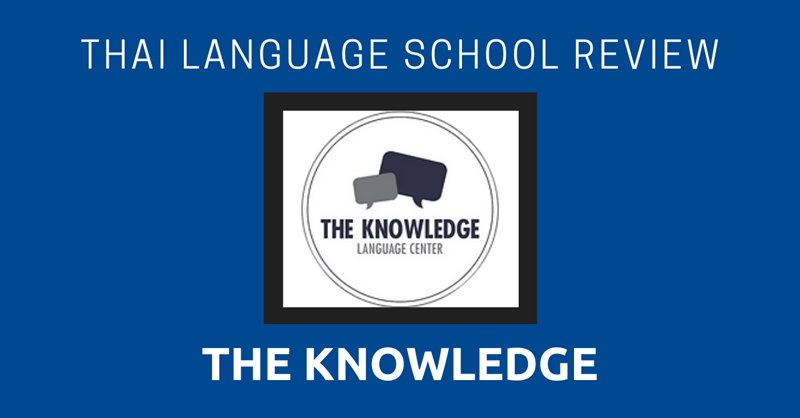
School: The Knowledge
Website: The Knowledge
Address: 193/28 Lake Rachada Office Complex 5th floor Rachadapisek Road, Khlongtoei, Khlongtoei Bangkok 10110
Email: [email protected]
Telephone Number: 02-264-0276
Facebook: The.Knowledge.Bangkok
Location
It’s about the same walk coming from the Queen Sirikit MRT station as it is coming from the Asok BTS station. It’s across from Queen Sirikit Park almost right next to a big open air Thai food market. Take the lift to the 5th floor of Lake Rachada and you’re there.
Learning Method
I had been to this school when they first opened, but at that time they were still developing their curriculum so I didn’t review it. Now they appear to have their “sea legs” and are up-n-running with their material.
What this isn’t, is a Union Clone school. Instead it takes a fairly new approach to how the language is presented to students.
Classroom
The school is quite large with a very open floor plan and a modern look, versus some of the older Thai schools which haven’t been remodelled in years and are dark dingy hole in the walls.
Their front staff all seems super competent and have a good grasp of English (as they should seeing as it’s an English school too). They are more than helpful, know the courses offered and can explain them in detail.
The classrooms are carpeted, which cuts down on the echo in the rooms. In tile floor classrooms sometimes (for me) it’s too echo-y (ambient) and I can’t really hear the subtle differences in pronunciation clearly.
Materials
Their material is broken down into Speaking/Listening 2 levels/2 books). Level 1 Book 1 and Level 1 Book 2 Speaking/Listening are 80 hour courses each and Level 2 Speaking/Listening is 100 hours. The curriculum is well thought out and introduces question words quite early in the course (a plus seeing as foreigners here tend to ask questions a LOT!).
Each lesson also has accompanying flash cards which the teacher uses in class as review to check vocab retention. Granted it’s a simple thing, but I don’t recall seeing any other schools use them to the degree The Knowledge does. After every 4 lessons there’s a quiz covering the materials taught in the previous 4 lessons. This is also a technique which helps ‘cement’ vocab and structure rather than a review at the end of a module where material can be forgotten too easily.
Course
The Reading/Writing Level 1 course is broken down into three modules with two 12 hour modules and a final one of 16 hours. All in there are 40 lessons. It is pretty well put together and is a no nonsense way to go about learning to read Thai. The Reading/Writing level 2 course has 25 units, each in 2 hour lessons.
The main textbook is “Everyday Thai for Beginners” (easily one of the best learn Thai books IF you can already read Thai), and there is also a supplemental exercise book. As the lessons progress they get more involved as far as the difficulty and the amount of writing you do.
Method
First off, no matter what course you sign up for at this school; IF you’ve never studied Thai with them before you must attend a 8 hour orientation class.
The orientation covers, how the class will be taught, an overview to the pronunciation of their karaoke system, what is expected of the students as far as conduct/attendance and a ‘sample class’ where a few basic classroom terms are taught showing the methodology at work. I think if more schools did this there wouldn’t be that 1-2 day ‘deer in the head-lites’ dazed/glazed look students have comin’ outta the beginning class.
They also teach in a cycle where every 4 lessons they let new enrollees join in. Of course that’s AFTER that student has gone thru orientation. Now, this is done to stop the incredible time lag from enrollment to attending at module based schools, especially Union Clone ones.
If I sign up at a Union Clone school but the term is already 4 days in, I can’t start until the following term (month). By running their modules in cycles The Knowledge gets around this. There will be some vocab students who just started don’t know versus ones who started on Lesson One but it appears the lessons are for the most part stand alones not daisy-chained together.
Vocab is covered, pronunciation is practiced, dialog is gone over, then practiced between students and with the teacher. Topics early on are as expected; What is your name? Where do you come from? As I said earlier though, question words are introduced early in these lessons, AND covered with a variety of ways to say them.
Teachers
In the class I observed I thought the teacher was more than competent in controlling the class, in catching errant pronunciation, in really making sure the students practiced the dialog and understood what was being covered. They certainly seemed to be dedicated to what they’re doing.
They also seem totally at ease with big, loud foreigners and not at all reticent to call one to task or get them back on target if they stray too far afield.
Class Size
Class sizes are limited so as not to over tax the teacher but more importantly NOT to short change the student by having a teacher spread too thin and unable to spend time individually. At this time they offer afternoon and evening classes. However they’re prepared to offer morning classes if the demand is there. They offer private lessons as well, either with their material or material supplied by the students.
ED Visa
This school does offer ED visa support on their 400 hour yearlong Thai program.
Now with that being said, due to the train wreck of the ED visa system as it relates to private Thai language schools, the school cannot guarantee a student will get a 90 day extension at the Thai immigration office, even with perfect attendance.
Still they do offer an ED visa program. Please note that there are quizzes which the students must take on their own time which are submitted to the Ministry of Education to garner paperwork for extensions of stay.
Disadvantage
I would be doing a disservice to potential students if I didn’t at least mention the HUGE disconnect between any karaoke system I’ve seen and the one used by this school. It is without question possibly the worst ‘karaoke system’ I’ve ever seen, with no diacritics for intonation.
They also have some sketchy renditions of words. There seems to be no or very little distinction between long/short vowels ญี่ปุ่น is yii-bpOOn. Now thankfully they do have the words in Thai script too in all their books.
This is a plus and can help students start recognizing how Thai is written before they take a reading/writing class.
Now for some of you ‘gotta read Thai to speak clear Thai’ purists out there, this could be looked at as a good thing, because the faster you can start to read, the faster you can forget this karaoke system. The work around is to write down what you think you hear, like students do in text books no matter what karaoke system is taught.
Should I Study Here?
For a school which isn’t a “Union Clone” (although it might be a close “L/X Clone”) they seem sincerely interested in teaching foreigners Thai rather than just going thru the motions. I’d recommend you stop by and check them out.
Also, please do note that their course can be slightly more expensive than other schools. They charge 9,000 baht for a 40-hour course. For other schools, price is usually around 8,000 baht for a 60-hour course.
(BTW: Tod is NOT affiliated with any Thai language school)


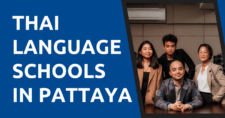
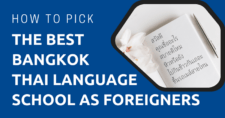
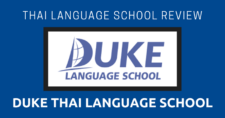
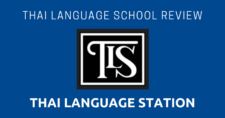
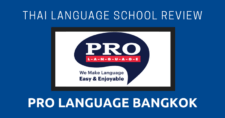
I have to say this school is indeed one of the best in Bangkok! I studied with them for 2 years and just completed a 2 year long stay with ED visa from this school (I just moved to Vietnam, so that’s why I left beginning of this year). It’s quite clear the steps and instructions needed to be done for a successful ED visa. I know the school does do the best that they can for each student, and they are definitely on your side and quite accommodating when it comes to visa things. Although Thailand may be known for their “grey areas”, but the visa process is quite straight forward and immigration does try to make sure that foreigners are here and legitimately learning while on their student visa.
Thanks for your comment Alexandra!
Very incompetent and unprofessional visa team. Expect to you problems with your ED visa here.
Love your reviews series, they come in handy, In Thai web world of misinformation, they sure are a fresh breeze…. I am seriously thinking about choosing the year long premium course of this school, but it scared me a bit, that I have to pay up front, without guarantees my visa will be renewed even if I study and attend classes competently. Is this still the case this year? I’m glad they seem to speak “proper” English since I’m native Portuguese and English is just my second language… Thanks for advice, hope you can quell my fears a bit. Best regards 🙂